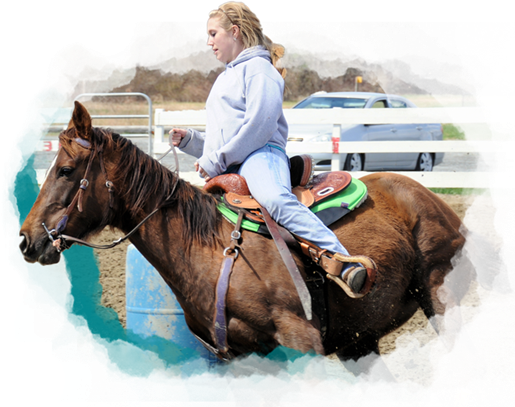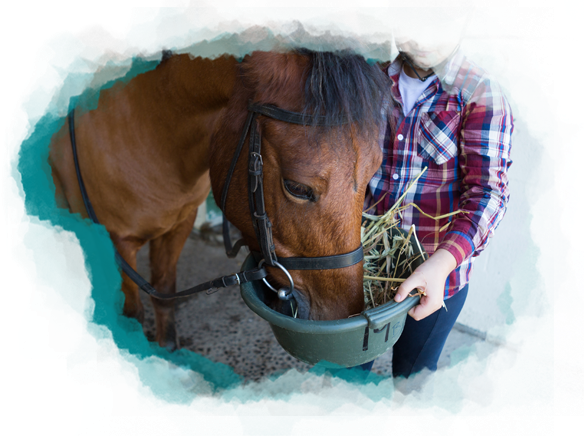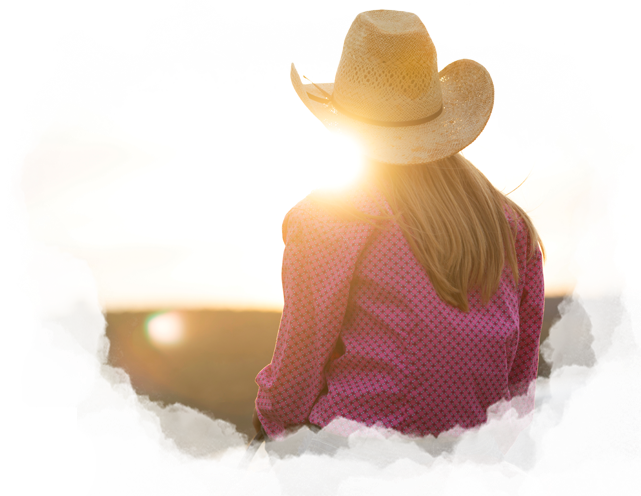At Moonridge Academy, we believe that horses can help teens in many ways. Our Equine program is one of the best in the country, and we know that horse therapy can be a powerful way to learn life lessons. Horses are great teachers, and we are proud to offer this program to the teens and their families that choose Moonridge Academy.
Horsemanship instruction is the perfect way for teens to learn how to ride a horse while also building responsibility, trust, and confidence. Our Equine Director oversees this skill-based program and ensures that safety is always the number one priority. Teens start by learning the basics of horse care and how to saddle up before progressing through training on the ground and horseback riding.
Horses are wonderful creatures, and we are excited to offer this program to teens. We believe like the old saying says, "To take care of a horse is to take care of one's self and soul"


Horsemanship
Horsemanship instruction is the perfect way for teens to learn how to ride a horse. Our Equine Director oversees this skill-based program and ensures that safety is always the number one priority. teens start by learning the basics of horse care and how to saddle up before progressing through training on the ground and horseback riding. And parents can take comfort in knowing that teens are never allowed to ride unless they are declared medically fit to do so by a physician.
Your teen can advance through our program at their own pace, free from pressure to do anything more than what they're comfortable with. By the end of their journey with us, they will be confident western-style riders. And more importantly, confident in their brand new life skills that will help them long after they leave our program.
Learning to care for a horse is a great way for teens to learn how to be responsible for another living creature. It's also a way to bond with an animal and build trust. We've seen firsthand the positive impact that horsemanship instruction can have on teens, both during their time in our program and after they leave.

Barn Chores
Our equine program includes the daily care of our horses. All teens participate in daily barn chores, including feeding/watering horses, grooming as needed, and cleaning the horse area. We find that as teens work with horses daily, they can practice mindfulness skills and gain in their own emotional regulation.
By working with horses daily, teens will be able to improve their emotional well-being while also caring for these beautiful creatures. They will have the opportunity to learn new skills and grow in ways you never thought possible.

What Do Teens Gain from Equine Therapy?
Plenty! Moonridge Academy teens learn empathy, compassion, teamwork, and communication skills while working with our horses. Teens are able to begin processing their trauma. Teens also develop a stronger sense of self-awareness and confidence.
Develop Courage
Many of teens have never had the opportunity to interact with horses. Riding such large animals is a completely new experience for many of them.
It can be scary at first, but it's also an excellent learning opportunity. As they begin to overcome their initial fear, they also start to develop a new pattern of challenging old fears and finding the courage to improve.
This is an important life skill they can carry with them long after leaving our program. By facing their fears and learning to trust the horses, they are learning how to trust themselves and build the confidence they need to succeed in life.

Increased Self-Confidence and Direction
Horsemanship is an exciting new skill for many of teens. They experience the increased self-confidence that comes from learning how to do something potentially frightening or different while they are on horseback, but with practice, it becomes simple and easy!
While riding their horses gives them invaluable lessons about being decisive in order not only navigate through problems effectively themselves - which often carry over into other aspects of your life too
Improved Communication Skills
Horses are sensitive to the nuances of their riders' non-verbal cues. As we teach teens about how these subtle signals can affect a horse and what it means for them, they will begin paying more attention to their other non-verbal communication--including with family members and friends.
This improved communication can lead to more productive relationships all around. In addition, as they learn how to better communicate with horses, they will also learn how to better listen--a skill that is essential in both personal and professional settings.

Discipline and Positive Focus
Caring for a horse can be a rewarding experience for teens. It allows them to learn about an animal that is often seen as majestic and mysterious, and it also gives them a chance to develop essential life skills. One of the most important things that teens learn through horse care is self-discipline.
Caring for a horse requires consistent effort and attention, and teens often find that they need to set aside their personal feelings to meet their horse's needs. As a result, they often develop increased self-discipline, which can be applied to other areas of their life.
In addition, teens frequently find that they develop more positive thought patterns as they focus on the tasks of caring for their horse. As they see the results of their efforts, they often feel more capable and confident, leading to improved self-esteem. Ultimately, teens who are involved in horse care often find that they benefit in many ways, both personal and academic.
Improved Ability to Trust
Many of the teens that come to Moonridge Academy come from difficult backgrounds and have experienced trauma in their lives. For these teens, it can be hard to trust anyone, let alone something that is bigger than themselves.
However, through our program, they learn that it is possible to develop relationships of trust. They see that there are people and organizations out there who care about them and are willing to help them succeed. As a result, they begin to open up and believe that they can create a better future for themselves. In short, our program teaches them an essential life lesson: that trust is possible, even after trauma.

Self-Acceptance
Animals have long been used in therapy, and horses are particularly well-suited to this purpose. The unconditional acceptance of friendship that an animal can give allows some of teens to accept themselves for who they are and is often a positive first step in developing normal relationships.
As teens feel accepted by a horse, they often come to terms with themselves in a way that allows them to accept themselves as well. This self-acceptance is an important step in the healing process, and we are grateful to have such a powerful tool at our disposal.
Respect for Others
As any horse lover knows, horses are intelligent and sensitive creatures. They are also very social animals and thrive on positive human interactions.
In order to build a positive relationship with a horse, it is essential to show respect. This means treating the horse with kindness and consideration and taking care to avoid anything that might frighten or hurt him. When a horse feels respected by the horse's human companion, the horse will respond in kind, forming a strong bond of trust and mutual respect.
For many, this bond is one of the most rewarding aspects of horsemanship. But it is also important to remember that horses can teach us valuable lessons about respect. As we learn to earn and give respect to our equine friends, we can also develop greater respect for our family members and friends. By developing this mutual respect, we can create stronger, healthier relationships with the people in our lives.
Contact us today to learn about enrolling your teen in our horsemanship program. We'll be happy to answer any of your questions and help you get started.

